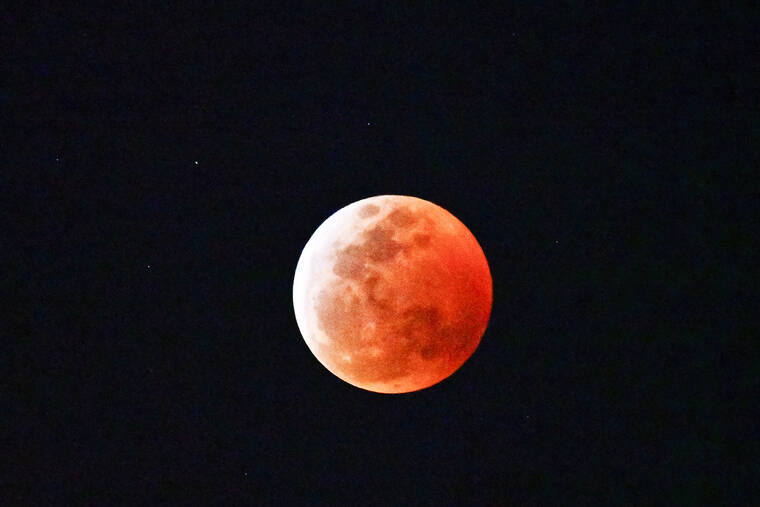LIHU‘E — The full Beaver Moon lunar eclipse that will take place on Thursday night into early Friday morning will be the longest event of the century, according to the Space.com website.
Joe Rao, reporting for Space.com, said the event lasting three hours, 28 minutes, and 23 seconds will greet early risers before dawn on Friday morning across North America. This makes the eclipse the longest lunar eclipse in 580 years, states the Space.com website.
“Most North Americans will need to get up early, and look low in the west toward daybreak,” Rao said. “The farther west you are the better, as the moon will appear much higher from the western part of the continent as opposed to locations farther east.
This means people in Hawai‘i will be treated to the maximum effect of the partial eclipse when the Earth’s shadow covers only parts of the moon, states the Time and Date website.
“There are no other locations on Earth where the moon appears completely covered during this event,” states TimeandDate.com. “The Earth’s shadow covers a large portion of the moon, so this is still a nice sight.”
According to Time and Date, the Penumbral Eclipse, based on Honolulu, Hawai‘i, starts at 8:02 p.m. with the moon nearly 31 degrees above the horizon. During this phase, the Earth’s penumbra starts touching the Moon’s face.
At 9:18 p.m., the partial eclipse begins, and the moon is starting to show red at nearly 50 degrees above the horizon.
The maximum eclipse takes place at 11:02 p.m. when the moon is closest to the center of the Earth’s shadow. At that point, the moon is just over 72 degrees above the horizon.
The partial eclipse ends at 12:47 a.m., Friday.
The timetable is based on optimum viewing conditions dictated by the weather.
According to the National Weather Service, the forecast for Lihu‘e on Thursday night calls for scattered showers, mainly after midnight. The NWS is also forecasting mostly cloudy conditions with a chance of precipitation of about 30%.
Time and Date forecasts the next total lunar eclipse will occur on May 15, 2022, and another total lunar eclipse taking place on Nov. 7 and 8, 2022.





Thanks a lot. I already saw Jupitar from Kaua’i with the naked eye. This was a story done by Brittney Lite. Finding Jupiter. Jupiter is 30 times larger than the earth. And could be seen that night.
Now it’s the lunar eclipse. I will make sure to set a time on Thursday and see if I can see it.
There is a lunar eclipse happening as I type. It can be seen clearly if your area in Hawai’i has no clouds. Clear skies ahead from where we are at in Massachusetts. The lunar eclipse is when the earth’s shadow covers the moon. The moon is behind the earth, from the sun.
I can see it clearly, partial, then it will be full eclipse later on tonight. About 11:02 pm. Just about.